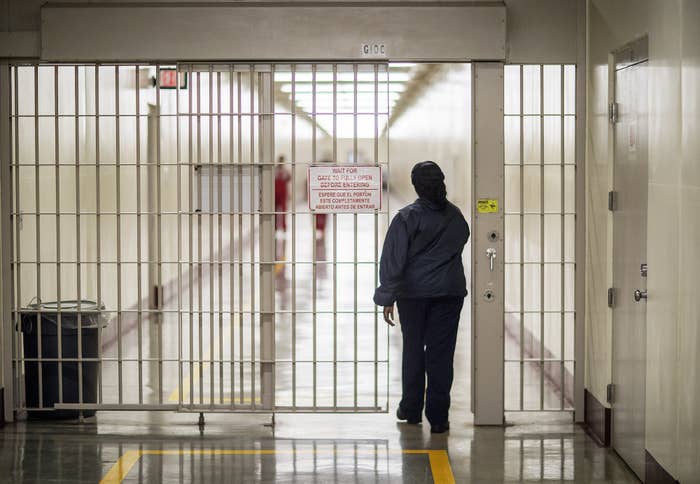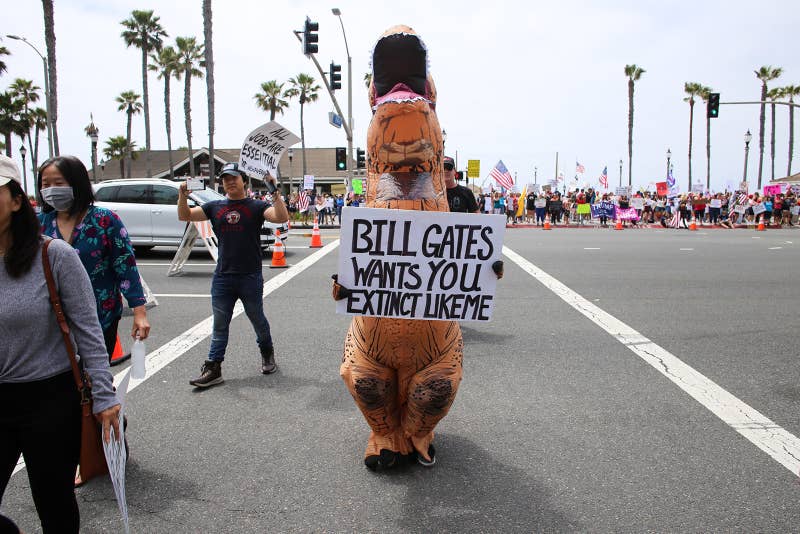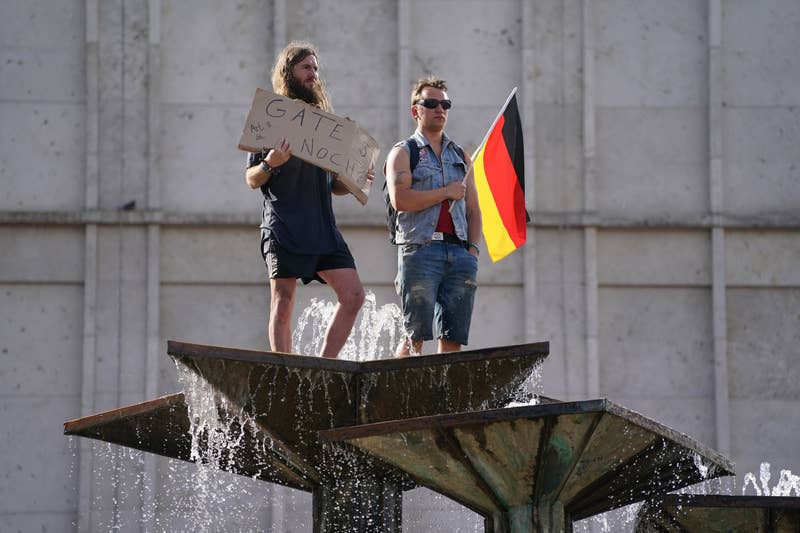Hong Kong police fire tear gas on national anthem bill protesters
Demonstrators in Hong Kong are protesting a bill that would make it illegal to abuse the Chinese national anthem. Police have fired tear gas into crowds that had tried to gather near the city-state's legislature.
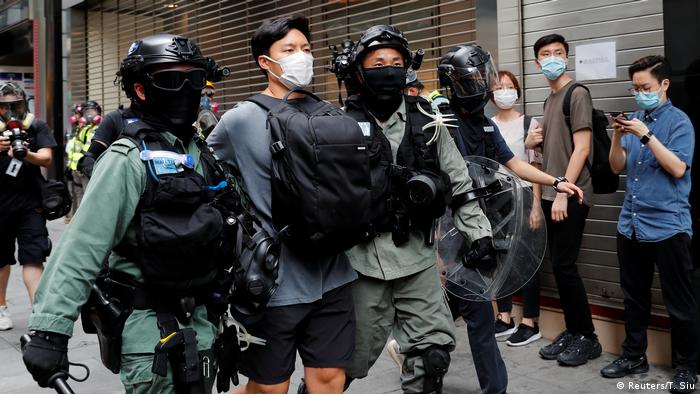
Hong Kong police on Wednesday fired pepper ball rounds into crowds that had gathered in the city's commercial district to protest a bill that would criminalize mocking the Chinese national anthem in the semi-autonomous city-state.
Demonstrators had gathered for the protest early Wednesday. A few hundred protesters chanted slogans during a lunchtime rally, but dispersed after police fired multiple rounds of the projectiles, which release an irritant similar to pepper spray.
On Tuesday, protesters online had called for demonstrators to create dysfunction in the city in attempt to derail the second reading of the bill, which would apply a prison sentence and financial penalty to anyone who "mocks or misuses" China's national anthem "March of the Volunteers."

A heavy police presence discouraged protesters from surrounding the Legislative Council as planned. Police also reported incidents of obstruction to traffic and certain subway stations. Seven people were arrested, mostly teenagers, who police said were in "possession of instruments fit for unlawful purposes," including petrol bombs, helmets, gas masks, scissors, and screwdrivers.
What is the bill?
If passed into law, the bill would govern when the Chinese national anthem is played and behavior related to it in Hong Kong.
The bill states that "all individuals and organizations" should respect the national anthem and play it and sing it on "appropriate occasions."
Violators would be threatened with up to three years in jail and/or fines of up to HK$50,000 ($6,450, €5,913).
Primary and secondary schools would also be required to teach the song, as well as its history and etiquette.
Why the controversy?
Critics argue that the national anthem bill would curtail freedom in the city.
The bill is also the latest development in in what many in Hong Kong see as increasing attempts by China to interfere in the special administrative region,
Last week, protests erupted again in Hong Kong after Beijing unveiled new national security legislation for the city-state that seeks to address secession, subversion and terrorist activities.
But China has said the security laws do not pose a threat to Hong Kong's autonomy and that the laws will have a narrow focus.
As for the anthem bill, Beijing maintains that the law is intended to boost patriotism and foster the country's socialist values.
The bill is expected to be turned into law next month.
kp/aw (dpa, Reuters)
Date 27.05.2020
Related Subjects People's Republic of China, Hong Kong
Hong Kong: Carrie Lam defends mainland security law
Chief Executive Carrie Lam said a controversial security law will not impinge on the city's rights and freedoms. Her comments followed major protests against the draft bill.

China's plan to impose a new security law on Hong Kong will not diminish the city's rights and freedoms, Hong Kong Chief Executive Carrie Lam said on Tuesday, as she tried to reassure international investors worried by the proposal.
Lam urged citizens to wait to see the details of the legislation, and said the law would "only target a handful of lawbreakers." However, she did not provide exact details on how the law would be applied or what actions and opinions would be deemed illegal.
Beijing announced plans last week for national security legislation for Hong Kong, that aims to ban secession, subversion, terrorist activities, and foreign interference in the city, after months of pro-democracy protests last year.
Opponents of the legislation fear the proposal, which could see Chinese intelligence agencies set up official bases in the city, could bring the end to Hong Kong passing its own laws.
The draft law is expected to be approved on Thursday, and could be implemented by the summer.
Read more: China's proposed security law: A death sentence for Hong Kong?
'No need to worry'
"There is no need for us to worry," Lam told a weekly news conference.
"In the last 23 years, whenever people worried about Hong Kong's freedom of speech and freedom of expression and protest, time and again, Hong Kong has proven that we uphold and preserve those values."
"Hong Kong's freedoms will be preserved and Hong Kong's vibrancy and the core values in terms of the rule of law, the independence of the judiciary, the various rights and freedoms enjoyed by people, will continue to be there," she added.

2 MIL HONG KONG PROTESTERS LAST FALL
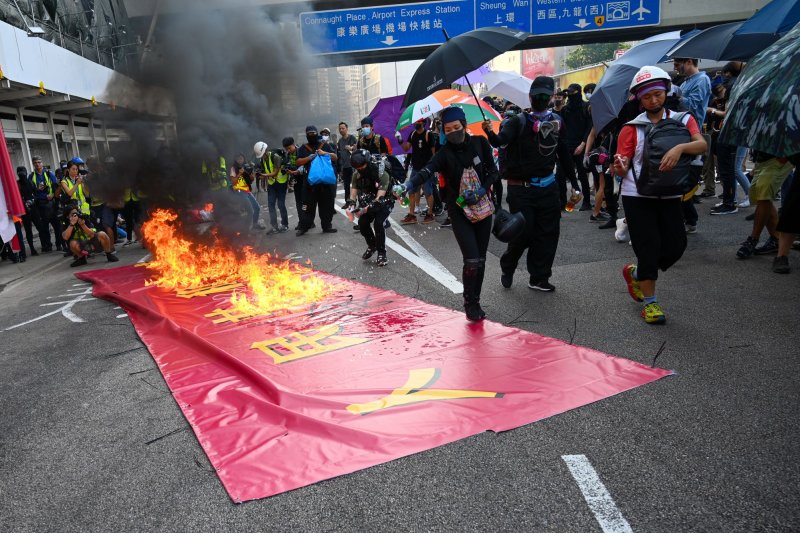
Protesters burn a sign celebrating the 70th anniversary of China during an anti-government rally in Hong Kong on October 1. File Photo by Thomas Maresca/UPI | License Photo
May 26 (UPI) -- Hong Kong leader Carrie Lam defended a controversial China-proposed national security law from criticism that it will strip the city of its autonomy, stating it will "only target a handful of people" while protecting the majority of citizens in the special administrative region.
During a press conference Tuesday, Lam, the city's chief executive, explained the recently proposed law will "plug the loophole" and protect national security from acts of secession, sedition, subversion and terrorism, as well as from international forces.
"We are protecting the large majority of law-abiding citizens in Hong Kong," she said. "They will continue to enjoy [their] rights and freedoms."
Late last week, China proposed the national security law following nearly a year of pro-democracy protests that Beijing has claimed were at least partially fueled by foreign actors. The protests, which calmed amid the coronavirus protests, reignited over the weekend, resulting in at least 180 arrests.
Critics have warned the law will essentially be the end of the One Country, Two Systems framework Hong Kong has functioned under since it was returned from British to Chinese rule in 1997 and which affords it freedoms the mainland does not have.
The law has attracted widespread international worry and 233 parliamentarians from 26 countries signed a petition calling the law a "flagrant break of the Sino-British Joint Declaration," which promised Hong Kong 50 years of a "high degree of autonomy, rights and freedoms" after returning to Chinese rule.
Lam on Tuesday dismissed these concerns, stating the law will ensure the longevity of the One Country, Two Systems framework while accusing foreign politicians from countries with similar laws of being hypocritical.
"Most countries have their own national security legislation; why is it that in Hong Kong, which is an inalienable part of the People's Republic of China, will legislation for national security have a negative impact?" she said.
She dismissed claims it will weaken the city's freedoms as "groundless" and said that the semi-autonomous region's rights will continue.
The press conference came a day after Taiwan President Tsai Ing-Wen promised "necessary assistance" to the people of Hong Kong, calling the law a threat to the city's democratic freedoms and judicial independence.
Chief Executive Carrie Lam said a controversial security law will not impinge on the city's rights and freedoms. Her comments followed major protests against the draft bill.

China's plan to impose a new security law on Hong Kong will not diminish the city's rights and freedoms, Hong Kong Chief Executive Carrie Lam said on Tuesday, as she tried to reassure international investors worried by the proposal.
Lam urged citizens to wait to see the details of the legislation, and said the law would "only target a handful of lawbreakers." However, she did not provide exact details on how the law would be applied or what actions and opinions would be deemed illegal.
Beijing announced plans last week for national security legislation for Hong Kong, that aims to ban secession, subversion, terrorist activities, and foreign interference in the city, after months of pro-democracy protests last year.
Opponents of the legislation fear the proposal, which could see Chinese intelligence agencies set up official bases in the city, could bring the end to Hong Kong passing its own laws.
The draft law is expected to be approved on Thursday, and could be implemented by the summer.
Read more: China's proposed security law: A death sentence for Hong Kong?
'No need to worry'
"There is no need for us to worry," Lam told a weekly news conference.
"In the last 23 years, whenever people worried about Hong Kong's freedom of speech and freedom of expression and protest, time and again, Hong Kong has proven that we uphold and preserve those values."
"Hong Kong's freedoms will be preserved and Hong Kong's vibrancy and the core values in terms of the rule of law, the independence of the judiciary, the various rights and freedoms enjoyed by people, will continue to be there," she added.
The law sparks fears that it could allow for a wider crackdown on those voicing dissent against Beijing, as subversion laws are routinely used against critics of mainland China.
When asked by a reporter whether the law could be used to arrest protesters in Hong Kong, Lam waved off the question as "your imagination," adding that protests could continue if conducted in a "legal way."
Hong Kong markets down, as protests rattle investors
Financial fears
The announcement of the draft law, which will be written by Beijing and bypass Hong Kong's legislature, sparked the biggest drop on the city's stock exchange in five years on Friday, but Lam called the fears over business-related freedoms "totally groundless."
On Monday, Xie Feng, the commissioner of the semi-autonomous city's Ministry of Foreign Affairs, also defended the law, telling investors that "there was absolutely no need to panic."
Meanwhile, the United States, Britain and the European Union expressed concerns over the laws, while the US warned that Hong Kong could lose preferential economic treatment if the law took eff

New wave of protests
Thousands protested on Sunday after the law was announced, while police fired tear gas and water cannons to disperse the crowd, and arrested almost 200 people.
More protests are expected in the city on Wednesday, against both the national security law and a bill that would criminalize insults to China’s national anthem.
Sunday's demonstrations marked the first major clashes since massive and often-violent pro-democracy protests shook Hong Kong last year over a bid to introduce an extradition law with China.
While the contentious extradition law was scrapped, demonstrations continued over calls for universal suffrage, amnesty for those arrested, and calls for an inquiry into the police force's handling of the demonstrations.
lc/aw (Reuters, AFP)
Date 26.05.2020
When asked by a reporter whether the law could be used to arrest protesters in Hong Kong, Lam waved off the question as "your imagination," adding that protests could continue if conducted in a "legal way."
Hong Kong markets down, as protests rattle investors
Financial fears
The announcement of the draft law, which will be written by Beijing and bypass Hong Kong's legislature, sparked the biggest drop on the city's stock exchange in five years on Friday, but Lam called the fears over business-related freedoms "totally groundless."
On Monday, Xie Feng, the commissioner of the semi-autonomous city's Ministry of Foreign Affairs, also defended the law, telling investors that "there was absolutely no need to panic."
Meanwhile, the United States, Britain and the European Union expressed concerns over the laws, while the US warned that Hong Kong could lose preferential economic treatment if the law took eff

New wave of protests
Thousands protested on Sunday after the law was announced, while police fired tear gas and water cannons to disperse the crowd, and arrested almost 200 people.
More protests are expected in the city on Wednesday, against both the national security law and a bill that would criminalize insults to China’s national anthem.
Sunday's demonstrations marked the first major clashes since massive and often-violent pro-democracy protests shook Hong Kong last year over a bid to introduce an extradition law with China.
While the contentious extradition law was scrapped, demonstrations continued over calls for universal suffrage, amnesty for those arrested, and calls for an inquiry into the police force's handling of the demonstrations.
lc/aw (Reuters, AFP)
Date 26.05.2020
Related Subjects The United Nations Children's Fund (UNICEF), Human Rights, People's Republic of China, Hong Kong
Permalink https://p.dw.com/p/3clB3

Carrie Lam: Security law will 'only target a handful' in Hong Kong

Protesters burn a sign celebrating the 70th anniversary of China during an anti-government rally in Hong Kong on October 1. File Photo by Thomas Maresca/UPI | License Photo
May 26 (UPI) -- Hong Kong leader Carrie Lam defended a controversial China-proposed national security law from criticism that it will strip the city of its autonomy, stating it will "only target a handful of people" while protecting the majority of citizens in the special administrative region.
During a press conference Tuesday, Lam, the city's chief executive, explained the recently proposed law will "plug the loophole" and protect national security from acts of secession, sedition, subversion and terrorism, as well as from international forces.
"We are protecting the large majority of law-abiding citizens in Hong Kong," she said. "They will continue to enjoy [their] rights and freedoms."
Late last week, China proposed the national security law following nearly a year of pro-democracy protests that Beijing has claimed were at least partially fueled by foreign actors. The protests, which calmed amid the coronavirus protests, reignited over the weekend, resulting in at least 180 arrests.
Critics have warned the law will essentially be the end of the One Country, Two Systems framework Hong Kong has functioned under since it was returned from British to Chinese rule in 1997 and which affords it freedoms the mainland does not have.
The law has attracted widespread international worry and 233 parliamentarians from 26 countries signed a petition calling the law a "flagrant break of the Sino-British Joint Declaration," which promised Hong Kong 50 years of a "high degree of autonomy, rights and freedoms" after returning to Chinese rule.
Lam on Tuesday dismissed these concerns, stating the law will ensure the longevity of the One Country, Two Systems framework while accusing foreign politicians from countries with similar laws of being hypocritical.
"Most countries have their own national security legislation; why is it that in Hong Kong, which is an inalienable part of the People's Republic of China, will legislation for national security have a negative impact?" she said.
She dismissed claims it will weaken the city's freedoms as "groundless" and said that the semi-autonomous region's rights will continue.
The press conference came a day after Taiwan President Tsai Ing-Wen promised "necessary assistance" to the people of Hong Kong, calling the law a threat to the city's democratic freedoms and judicial independence.
Hong Kong security law 'needed to tackle terrorism'
Security chiefs in Hong Kong have given their backing to a bill that pro-democracy activists say will end the territory's "one county, two systems" model. Activists are planning more protests, despite coronavirus.

Hong Kong's security and police chiefs rallied on Monday behind China's planned national security law, saying it was needed to combat growing "terrorism" in the city.
Pro-democracy activists in the island nation have warned that Chinas new law could mean the end of the "one county, two systems" principle.
Read more: Beijing says US is pushing China to 'brink of a new Cold War'
But Hong Kong Secretary for Security John Lee said in a statement that the bill would safeguard the city's prosperity and stability.
"Terrorism is growing in the city and activities which harm national security, such as 'Hong Kong independence', become more rampant," Lee said.
"In just a few months, Hong Kong has changed from one of the safest cities in the world to a city shrouded in the shadow of violence," he added.
Beijing announced the new legislation last Friday, which would allow Chinese intelligence agencies would be allowed to set up bases in Hong Kong. It aims to tackle secession, subversion, and terrorist activities.
The US, Australia, Britain, Canada, and others have expressed their concerns about the legislation, widely seen as a potential turning point for China's freest city and one of the world's leading financial hubs.
Pro-democracy protests reignited
Protesters took to the streets on Sunday, despite the ongoing coronavirus pandemic, chanting "Hong Kong independence, the only way out." Police said they arrested more than 180 people when authorities fired tear gas and water cannon to disperse the crowd.
Read more: Hong Kong: Taiwan offers help amid anti-China protests
Another round of protests is expected this Wednesday, as Hong Kong's legislature is expected to give a second reading of a bill that would criminalize abuse of China's national anthem.
Activist Joshua Wong attended the rally and encouraged others to keep up the pressure on the streets.
"Although they won't let us organize protests, we still need to gather," Wong said. "Now is the beginning of the end and time is running out ... the international community must stand with Hong Kong," he added.
jcg/rc (Reuters, dpa, AFP)
Date 25.05.2020
Related Subjects People's Republic of China, Hong Kong
Keywords Hong Kong, China, security, pro-democracy
Security chiefs in Hong Kong have given their backing to a bill that pro-democracy activists say will end the territory's "one county, two systems" model. Activists are planning more protests, despite coronavirus.

Hong Kong's security and police chiefs rallied on Monday behind China's planned national security law, saying it was needed to combat growing "terrorism" in the city.
Pro-democracy activists in the island nation have warned that Chinas new law could mean the end of the "one county, two systems" principle.
Read more: Beijing says US is pushing China to 'brink of a new Cold War'
But Hong Kong Secretary for Security John Lee said in a statement that the bill would safeguard the city's prosperity and stability.
"Terrorism is growing in the city and activities which harm national security, such as 'Hong Kong independence', become more rampant," Lee said.
"In just a few months, Hong Kong has changed from one of the safest cities in the world to a city shrouded in the shadow of violence," he added.
Beijing announced the new legislation last Friday, which would allow Chinese intelligence agencies would be allowed to set up bases in Hong Kong. It aims to tackle secession, subversion, and terrorist activities.
The US, Australia, Britain, Canada, and others have expressed their concerns about the legislation, widely seen as a potential turning point for China's freest city and one of the world's leading financial hubs.
Pro-democracy protests reignited
Protesters took to the streets on Sunday, despite the ongoing coronavirus pandemic, chanting "Hong Kong independence, the only way out." Police said they arrested more than 180 people when authorities fired tear gas and water cannon to disperse the crowd.
Read more: Hong Kong: Taiwan offers help amid anti-China protests
Another round of protests is expected this Wednesday, as Hong Kong's legislature is expected to give a second reading of a bill that would criminalize abuse of China's national anthem.
Activist Joshua Wong attended the rally and encouraged others to keep up the pressure on the streets.
"Although they won't let us organize protests, we still need to gather," Wong said. "Now is the beginning of the end and time is running out ... the international community must stand with Hong Kong," he added.
jcg/rc (Reuters, dpa, AFP)
Date 25.05.2020
Related Subjects People's Republic of China, Hong Kong
Keywords Hong Kong, China, security, pro-democracy
















